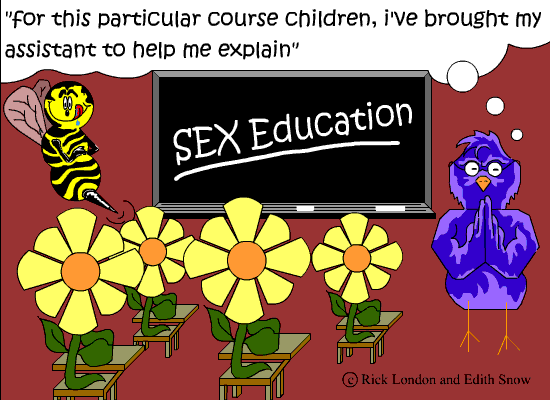Thursday, October 2, 2008

Let's talk about sex baby ... Sex Education, that is!
Sex Education programs have always been a rather controversial topic and sparked much debate between parents, educators, doctors, school administrators, healthcare providers, and even politicians. But I want to ask you, when is it too early to start teaching our children about sex?
Recent studies have shown that adstinence only programs are generally less successful than sex education programs -- and let's be real with each other, day in and day out all you see on television and in magazines is inuendos to sex and how good it is. If tat doesn't make you want to get your peice then you must be a corpse ... or very ugly!
When should you start talking about sex?
Toddler's love to explore their world and themselves. They're as curious as cat ... so, why are parents so afraid to be honest with them about what their body parts are.
In my opinion, a smart parent would begin their sex education from the beginning starting with teaching him or her what their body parts are and the difference between good touch and bad touch. Give your child the tools to be prepared for what the "big bad world" can throw at them whn they aren't with you ... especially if your child is being sent to childcare. Starting with the body parts is the foundation for the rest ...
Why don't abstinence only programs work as effectively?
First of, the foundation of the abstience only programs is to preach to the student about not having sex (church in the classroom). It doesn't present them with the facts: what forms of contraceptive are most effective; how to tell whether or not you need to see a doctor for an STD; what can happen during and after sex; etc. It leaves out the "meat and potatoes" and leaves the student at the mercy of the media to try and figure out the rest and fill in the blanks -- this is absolutely unacceptable and sets them up to fail.
But, the most important thing is that it closes the lines of communication. When their hormones get the best of them and they finally have sex for the first time, the student that was in the abstinence only program is less likely to speak to an adult about the event and, if need be, any health concerns they may have afterwards. Studies show that they are also less likely to seek contraceptives -- Big Mistake!
Preaching is not Teaching.
An appropriate alternative for the Abstinence-only programs is a comprehensive sex education program with an emphasis on celibacy ... give them the knowledge they need and then urge them to refrain from the act of sex (not just sexuality as a whole).
What makes a good Sex Ed Program?
- Provides accurate, evidence based information
- Offers information in context
- Is age appropriate
- Acknowledges individuality
- Is anti-racist and non-discriminatory
- Is engaging
- Meets people "where they are"
Keep in mind through all of this ... Knowledge is power!









0 comments:
Post a Comment